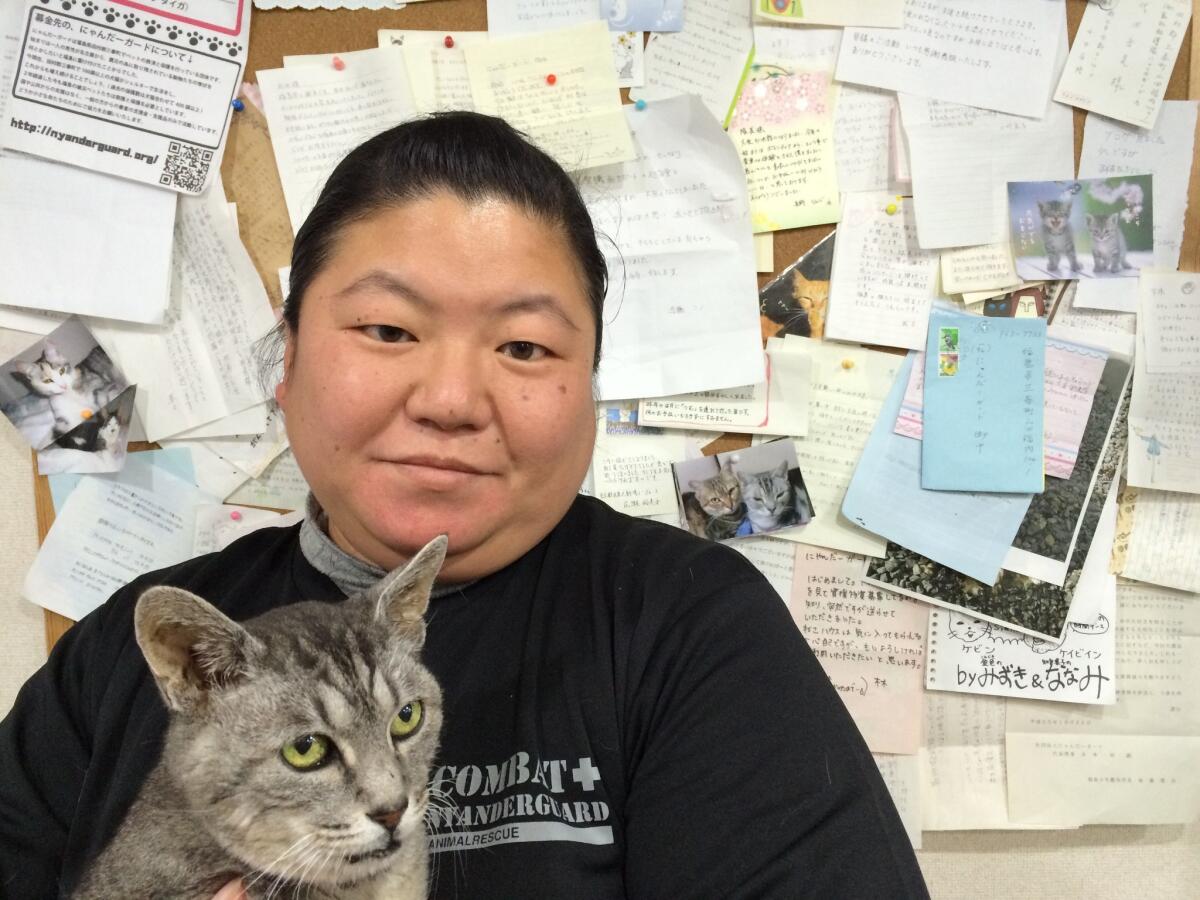On the Ground: Fukushima B&B: It’s for dogs (and cats). Kevin Costner hangs out in the dining room

Takemi Shirota, an employee at the Nyander Guard animal shelter in Japan’s Fukushima prefecture, holds a 20-year-old rescue cat named Kevin Costner.
Reporting from Fukushima, Japan — About 30 miles from the Fukushima Daiichi nuclear power plant, 130 cats and three dogs live in a drafty old bed-and-breakfast.
Cluttered but surprisingly calm, the Nyander Guard animal shelter was created in the aftermath of the March 2011 nuclear disaster here.
As residents fled their homes, an estimated 20,000 pets were left behind in the “exclusion zone” -- all the land within 12.5 miles of the plant. Akira Honda, a 52-year-old local businessman and animal lover, posted a call for volunteers online.
See the most-read stories this hour >>
The first rescue mission took place two months after the meltdown.
Sometimes the volunteers would join former residents on approved visits to reclaim belongings. But mostly they’d sneak into the barricaded area on their own.
“At the beginning, the gates were just temporary, built from steel pipes and things,” said Takemi Shirota, 39, who has worked at the shelter since its founding. “It was easy to move them to the side and go in.”
“We received lots of requests from pet owners to go and capture their animals for them,” she said.
That August, police briefly detained a few volunteers, then reinforced the barriers, making unapproved entry more difficult.
A few months later, the shelter joined the first -- and, it turned out, last -- mission organized by government authorities to aid the abandoned pets.
See more of our top stories on Facebook >>
“We never dreamed that that would be the only time that they’d conduct an official rescue,” Shirota said. “There’s no way people could rescue all those dogs at one time.”
Today, five years after the disaster, the areas around the nuclear plant are a suburban wilderness. Tall grass grows in the dirt between railroad ties, and traffic lights blink at empty intersections.
Donations to the shelter have dwindled, leaving it to the founder to cover utilities, food and its small payroll. Volunteers occasionally show up from around Japan to help out.
In all, the shelter has rescued about 750 dogs and cats.
Shelter workers enter the exclusion zone every few weeks with residents who have permits to stock food stations for animals left behind. There isn’t much capacity to rescue more.
“I have seen many dead cats, many dogs who starved to death,” Shirota said.
Back at the shelter, the staff struggles to find people willing to adopt the animals. “In Japan, people still buy their pets from pet shops,” Shirota said. “Being a foster owner of cats and dogs is kind of a new idea for them.”
The dogs are generally healthy, but the cats appear less so. Shelter workers suspect that being lower to the ground and licking their fur has exposed them to more radioactive particles. Sometimes they just die for no apparent reason.
One cat at the shelter is named Kevin Costner. The owner told shelter workers that he was a fan of the movie star. He didn’t realize that the gray tabby was a female.
He told the shelter’s owner that Kevin Costner was old with too many health problems and that he didn’t want the cat back. She spends most of her time in the dining room.
“Kevin hates other cats,” Shirota said. “But the volunteers and staff really like her.”
MORE ON FUKUSHIMA
In the shadow of Fukushima, a ghost town struggles back to life
Photos: Japan marks fifth anniversary of Fukushima disaster
Japan earthquake and tsunami: Before and after the cleanup
More to Read
Sign up for Essential California
The most important California stories and recommendations in your inbox every morning.
You may occasionally receive promotional content from the Los Angeles Times.










